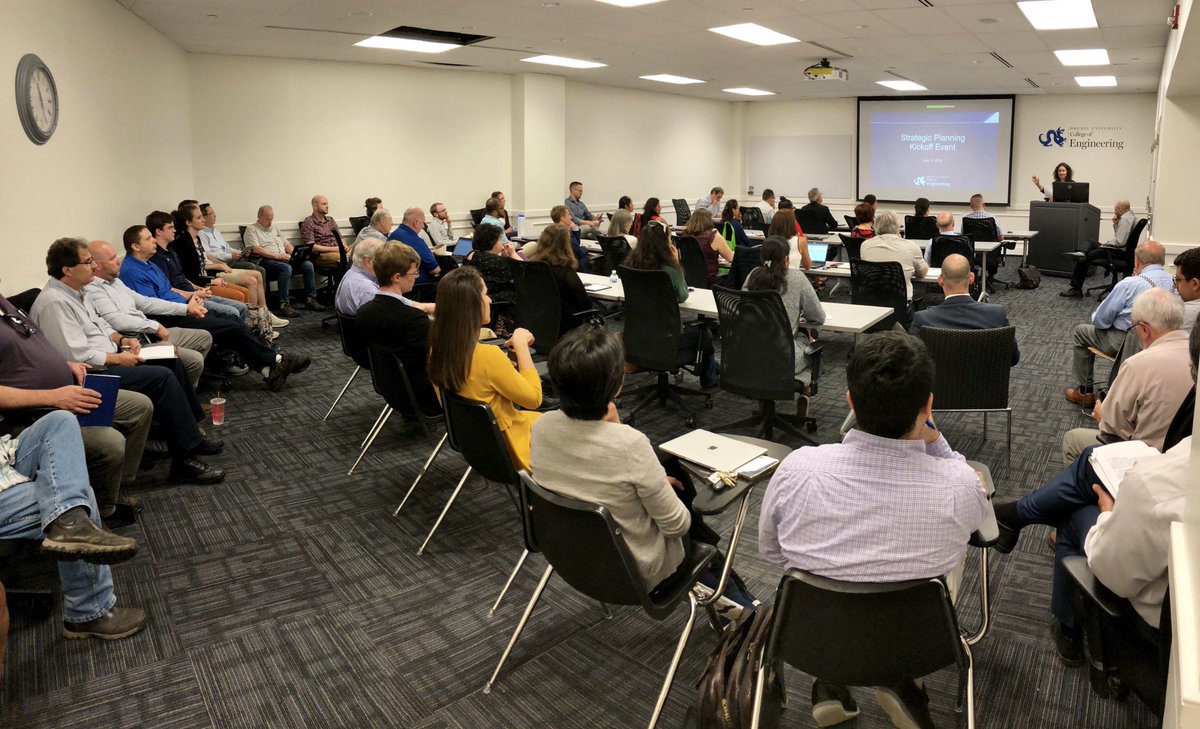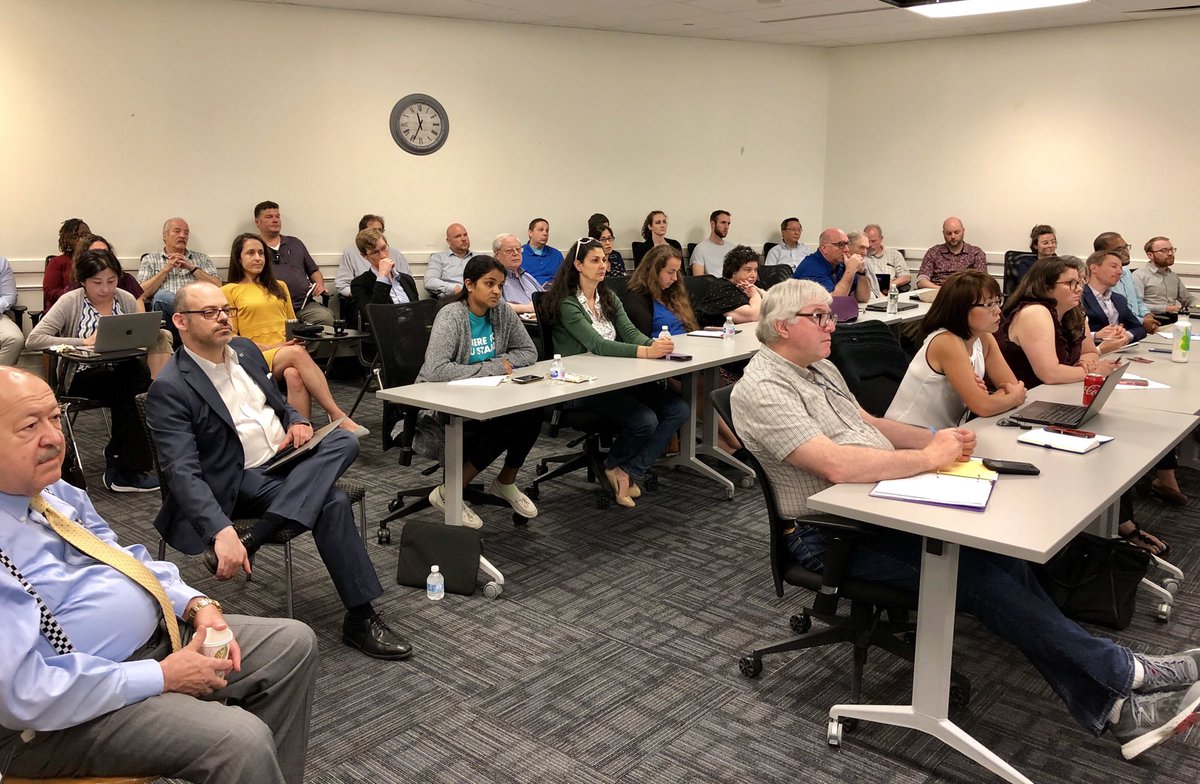“It is time for us to leverage the legacy of the College of Engineering as the cornerstone of Drexel University as we respond to the needs of 21st century engineering research and education,” Sharon L. Walker, dean and distinguished professor, told the college community at a recent strategic planning kickoff event.
Speaking to faculty, staff and students on Tuesday, June 11, Walker said, “We must be creative. We must be innovative. We must be disruptive.”

Dean Walker provided an update on the strategic planning process.
Thinking in new and out-of-the-box ways, said Walker, will be essential to helping the college conceptualize and ultimately, realize, approaches and solutions to advancing its work in the context of global issues facing engineers today and in the future.
Walker first introduced the strategic planning initiative last fall, with efforts getting underway earlier this year. The initial phase focused on discovery and framing through a comprehensive data review. Thought leaders and members of the faculty, staff, and student bodies came together for interviews and focus groups to share their feedback and experiences, which revealed a deeper perspective on the college’s past and present.
“We learned about the strengths of our collective assets, as well as where our challenges lie,” said Walker. “Understanding this context for our work, we created a strategy document that outlines a general framework for how we will determine priorities and calibrate our work going forward.
“This isn’t about just any school,” said Walker of the draft. “When you read through this, it is actually quite nuanced and very much about the College of Engineering and about Drexel. People should feel that this captures our core, shared values.”
Executive Committee & Work Teams
During the morning session of the kickoff event, Walker explained how the design principles of the strategy draft link to thematic areas, and announced the executive committee and work teams that will lead the college during the second phase of the strategic planning efforts.
“Involvement from across the college is critical to the success of this next phase of work,” said Walker. “Our intent was to form inclusive working groups with diverse representation from disciplinary backgrounds and the faculty, staff and student body. With the overwhelming response from our community, we were able to do just that.”
The executive committee includes: Jennifer Atchison, assistant teaching professor of Mechanical Engineering and Mechanics; Jason Baxter, professor of Chemical and Biological Engineering; Jeffrey Birou, research manager in Electrical and Computer Engineering; Linda Lee, senior director of finance and administration; Michele Marcolongo, department head and professor of Materials Science and Engineering; Ian Marcus, research project director; Steven May, associate professor and graduate advisor of Materials Science and Engineering; Kathryn Meier, assistant dean of Strategic Initiatives and Innovation; Franco Montalto, associate professor of Civil, Architectural, and Environmental Engineering; and Antonios Zavaliangos, A. W. Grosvenor Professor of Materials Science and Engineering and Mechanical Engineering and Mechanics.
Three work teams will address broad thematic areas.
- Cultivating People, co-led by Baxter and Birou, will assess and offer recommendations for how we will improve the quality of the student and faculty experience; effectively recruit, support, and develop talent among all faculty, staff, and students and for industry; and prioritize diversity, equity, and inclusion in all that we do.
“Everyone deserves a satisfying, productive, and respectful working and learning environment,” said Walker. “This team will examine the experience of everyone – faculty, staff, students and alumni – and how we bring the best people in, set them up for success, and create the most inclusive environment possible.”
- Distinguishing Value Proposition, co-led by Atchison, May and Montalto, will identify ways in which we will develop and deliver contemporary programs, curricula, and pedagogy for engineering; reimagine and expand COOP and industry partnerships; and identify and pursue areas of research excellence.
“This team is about what makes us special – our degrees, our research, our areas of strength,” said Walker. “It is important that we analyze our current activities, determine what is missing and what areas we need to bridge so our future work is conducted at the intersections of what matters.”
- Aligned Means and Conditions, co-led by Lee and Zavaliangos, will assess the big picture items and propose ways we will integrate the organization to execute on vision (structures and processes); improve and leverage physical assets (real estate and facilities); and increase funding (internal and external).
“Aligning what we want to achieve with the processes, procedures and policies that map to the outcomes we want is critical,” said Walker. “This is about more than funding and facilities. It is about how we will create the conditions that will allow us to optimize what we do in the College of Engineering.”

Faculty, students and staff joined Dean Walker for the strategic plan kickoff.
Walker also recognized the “outstanding response” from the student body to be involved, and announced the creation of a Standing Student Committee of undergraduate and graduate students, whose role will be to serve as a first-line resource to the work teams when data collection calls for input from the student body.
“I am so grateful for the positive response and interest in volunteering from across the college,” said Walker. “The ongoing input from individuals across our community will be essential to our future success.”
Visit the college’s strategic planning website for a complete list of all work team and student committee members.
Next Steps
The second part of the kickoff event included an orientation of the work teams to the overall strategic design framework and process, followed by breakout sessions by thematic area. During those sessions, work teams convened to discuss their charge, conduct initial analyses, and draft general framing questions and areas of inquiry for learning and investigation over the summer.
A strategy draft, inclusive of this early input from each work team, will be submitted to the president by the end of the month. Work teams will continue to collaborate over the summer, with a retreat planned for mid-fall.